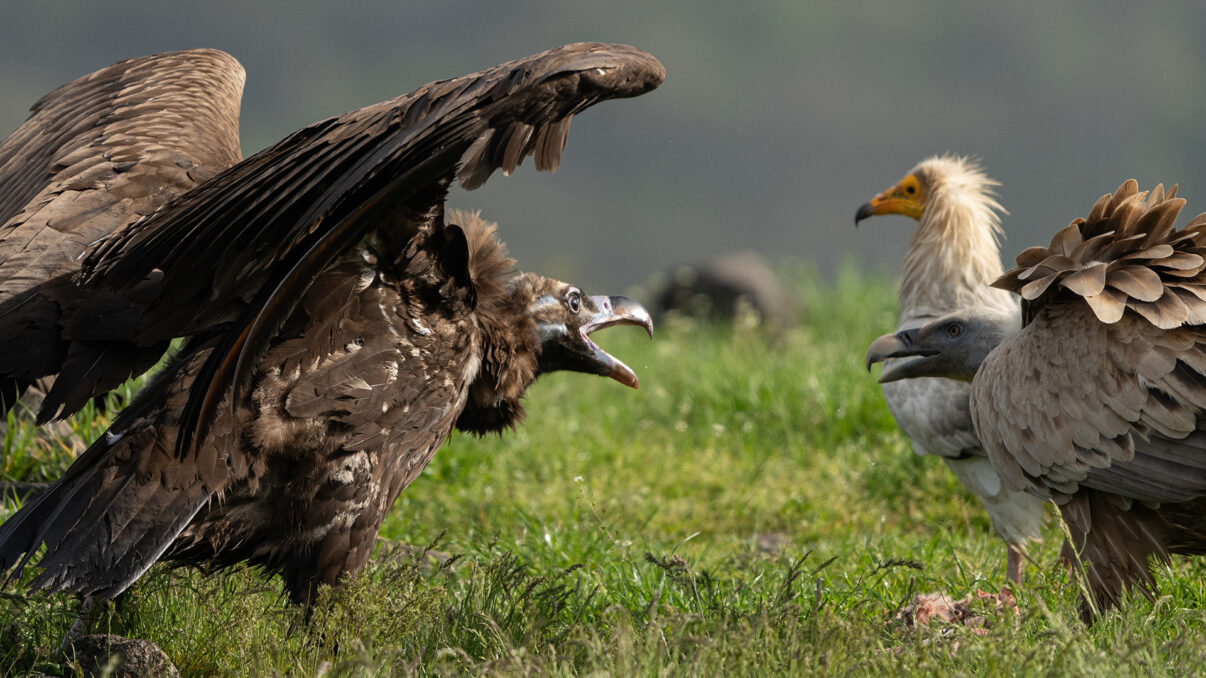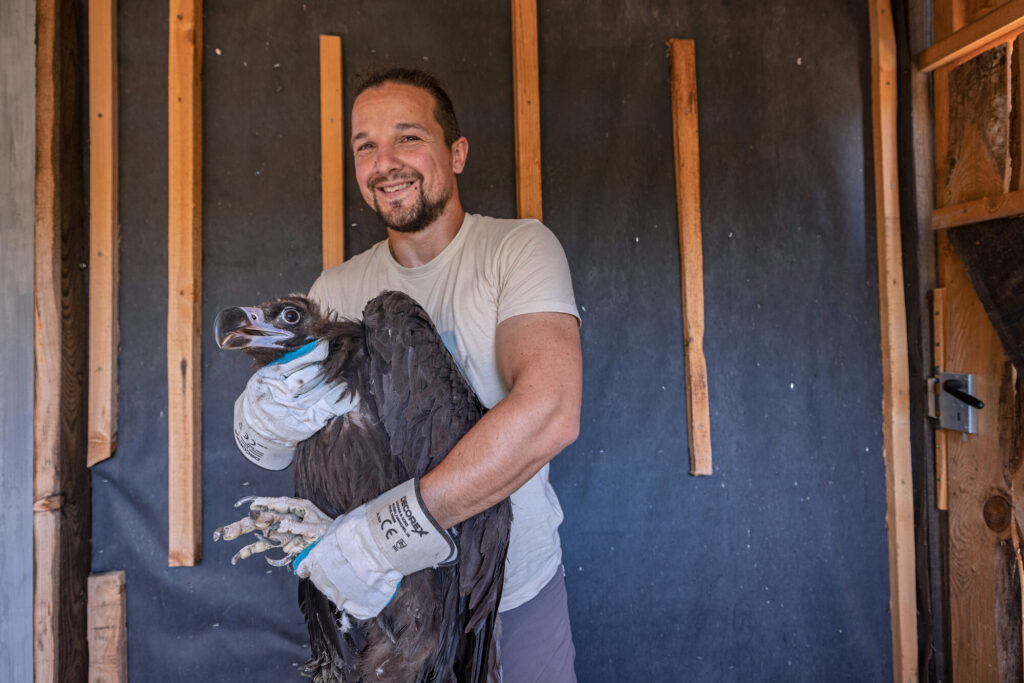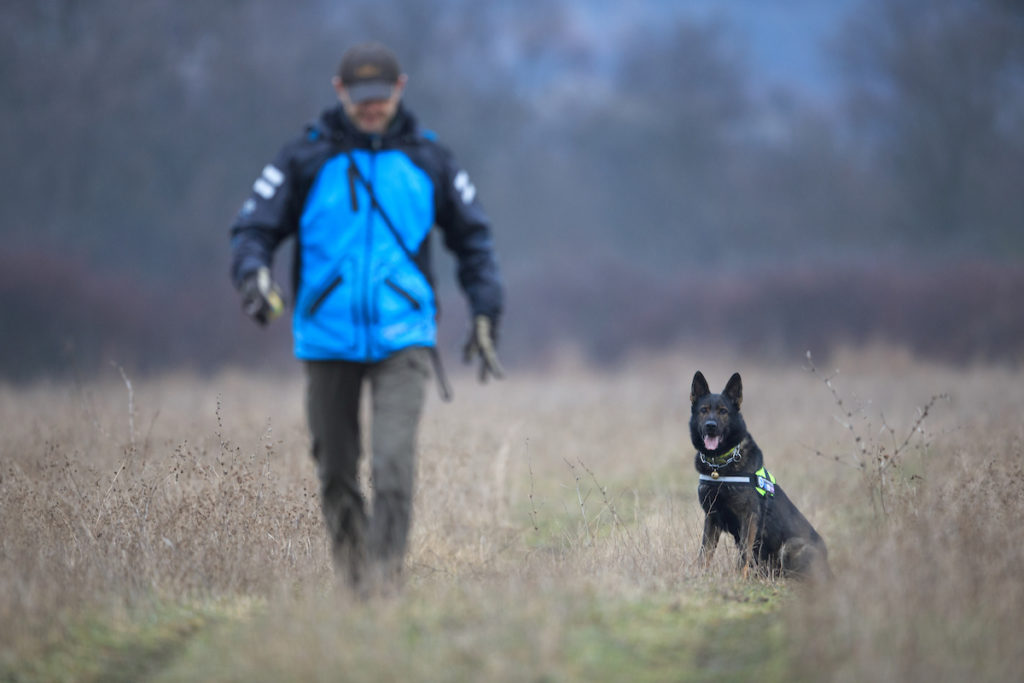A second group of cinereous vultures has just been released in the Rhodope Mountains in Bulgaria. Reinforcing the population already present in the area, the birds will strengthen the local circle of life, help to restore wild nature, and deliver benefits to communities in and around the rewilding landscape.

Strengthening the circle
On November 20, a second group of 13 cinereous (black) vultures was released in the Rhodope Mountains rewilding landscape in Bulgaria. The release is part of a long-term programme – overseen by the Rewilding Rhodopes team in collaboration with local partners the Bulgarian Society for the Protection of Birds (BSPB) – to re-establish cinereous vultures as a breeding species in the landscape. The birds are expected to form a colony with the cinereous vultures already released in the Eastern Rhodopes and Sakar Mountains in late 2022, as this keystone species gradually re-establishes itself within the local ecosystem.
As part of the rewilding vision for the landscape, the return of the cinereous vulture in the Rhodope Mountains promises to restore a vital part of the so-called “circle of life”. By supporting wildlife comeback and restoring ecological health, rewilding in the Rhodopes is also breathing new life into local communities by enabling the development of a thriving nature-based economy, with new jobs and income allowing people to stay in and return to the area.
The rewilding efforts of the Rewilding Rhodopes team – which also involves the return of red and fallow deer, European bison and semi-wild horses to the landscape – were beautifully showcased in a new documentary by award-winning French videographer Emmanuel Rondeau. Entitled “The Circle of Life in the Rhodope Mountains”, the film premiered on November 10 in the local town of Kardzhali, and will air online for the first time on December 14.
Emmanuel Rondeau’s new documentary “The Circle of Life in the Rhodope Mountains” will premiere online on December 14.
Great expectations
The first few days after their release are critical for the newly rewilded cinereous vultures. The birds need to learn to roost in safe areas close to the aviary, and return to feed at a feeding station managed by the rewilding team until they are strong enough to make longer flights and forage on their own.
A team from the BSPB is monitoring the birds during this time to make sure that they are safe and acclimatising well.
“The release is going according to plan,” says Dobromir Dobrev, a vulture expert working for the BSPB, who is attached to the Rewilding Rhodopes team. “So far the birds are calm and remain near the aviary, and eventually we expect them to join those vultures released last year. Our great hope is that next year we will have good news about the first nesting attempts.”
Following their arrival from Spain in June, the newly released cinereous vultures were temporarily housed in a large, purpose-built aviary. During the release the local rewilding team worked hard to ensure the birds’ transition from captive life to life in the wild was as stress-free as possible. Food was placed in front of the aviary, the doors were carefully opened, and human presence in the area was minimised.
In October, experts and volunteers tagged and fitted transmitters to the vultures, enabling the team to keep track of their health and movement in real time and to learn more about their life in the local landscape and beyond.

A historic decline
Cinereous vultures once ranged from Portugal all the way across Europe, through Turkey to the high mountains of Kazakhstan and the Mongolian steppe. However, like many vulture species, cinereous vultures have seen their historical range shrink and fragment as their numbers have plummeted, with populations subject to a combination of threats, including poisoning, habitat loss, diminishing availability of carrion, and collisions with power lines.
Today, the European cinereous vulture population is divided in two, with a population in Western Europe, and a separate remnant population in the Balkans. The cinereous vulture has been extinct as a breeding species in Bulgaria’s Eastern Rhodope Mountains since 1993.
Populations of vultures and other raptors in the Balkans still face a range of threats, with illegal poisoning top of the list. In 2016, as part of the LIFE RE-Vultures initiative, Bulgaria’s first anti-poison dog unit – comprising a highly trained dog and handler – began patrolling the Rhodope Mountains rewilding landscape. The main aim of the unit, which continues its work today, is to help establish poison-free areas by controlling and removing poisoned baits before they can negatively impact local wildlife.

Hope for the future
Over the next few years, the plan is to release an additional six to 10 individuals in the Rhodopes as part of the ongoing reintroduction programme. The establishment of a breeding cinereous vulture colony in Bulgaria will support the survival of the species in the Balkans. An exchange of birds with the last surviving local colony of about 25 to 30 pairs in the Greek part of the Rhodope Mountains is expected, as well as with newly formed colonies in the Stara Planina area. In conjunction, population restoration efforts in Bulgaria strengthen hopes that these iconic and ecologically important birds may once again soar across the breadth of European skies.
The cinereous vulture recovery programme in the Rhodope Mountains is being carried out by the Bulgarian Society for the Protection of Birds (BSPB), in cooperation with the Rewilding Rhodopes team, and is being funded by Rewilding Europe. The birds were provided by the Spanish NGO GREFA (Grupo de Rehabilitación de la Fauna Autóctona), which has been working for years to rescue and rehabilitate injured wild birds.
